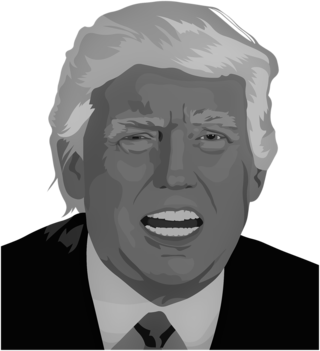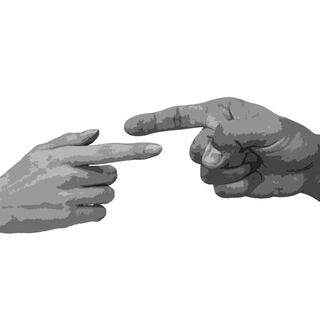Cognition
The Dangers of Narcissistic and Dichotomous Thinking
The nature of dichotomous thinking, and why it may appeal to Donald Trump.
Posted January 15, 2021 Reviewed by Devon Frye

What follows is a psychological analysis of a seductive but dangerous worldview, characterized by dichotomous thinking and hubris, both of which often appear to be adopted by Donald Trump (and many of his followers).
Pride of Winning and Shame of Losing
If you listen to Donald Trump’s words (e.g., speeches, tweets), you find countless references to winning and losing. “Donald Trump’s brand,” it has been claimed, “is about being a winner, about never, ever losing.” Perhaps this explains why Trump claims he did not lose the election but that the election was stolen from him.
Of course, Trump is not the only one who values winning. Is there anybody who doesn’t like to win? Winning and success are signs of competence. And when we feel competent, we feel proud. Pride is evoked when we feel responsible for a valued outcome—whether directly (e.g., winning a scholarship) or vicariously (e.g., as fans of the Super Bowl champion).
In contrast, shame and related experiences (e.g., embarrassment, disgrace, humiliation) are associated with loss and failure—with feeling incompetent, incapable, inadequate, weak, stupid, and so forth.
In reality, winning and losing are often not directly related to competence and incompetence. To illustrate, professional athletes are not being too humble when they attribute a win not just to their competence but also to how their teammates played, circumstances, chance events, their opponents’ play, etc.
If you were to engage in what is known as dichotomous or black-and-white thinking, you would not see such complexities or shades of gray. Instead, you would perceive the world in opposites: Winner or loser, competent or incompetent, right or wrong, great or disaster.
Pride and Shame in Dichotomous Thinking
On an emotional level, black-and-white thinking is attractive because it creates boundaries and walls that keep things separate. For instance, if, as a politician, you were to divide the world into enemies and allies, this reduces ambiguity, complexity, and uncertainty. In reality, however, an opponent in one situation might be your collaborator in another. So a more flexible way of thinking (i.e. diplomacy) would theoretically be better.
If we adopt a black-and-white worldview, we will experience difficulties not only in our relationships with others but also with ourselves. Yes, with ourselves. Since nobody is perfect, how could we integrate the “good” and the “bad” within us? How do we accept losing, if we think of ourselves only as a winner?
One way is to deny the loss. Another is to displace it onto others, blaming them for bringing us down through their incompetence or even maliciousness.
It is possible to see examples of this displacement in Trump’s claims regarding witch hunts and conspiracy theories. And to the extent he adopts an us-vs-them worldview, he also appears to believe that “Americans” too are continually the subject of mistreatment, disrespect, or ridicule by others, including allies, minorities, foreigners, refugees, and legal and illegal immigrants (e.g., see my article about the campaign ad featuring a Mexican immigrant smirking in court).
His solution? In past cases, he has cut ties with allies or attempted to ban or expel the "ungrateful" and punish the bad people.
Of course, as noted earlier, this black-and-white worldview is not always reserved solely for “others,” like, in the case of Trump, non-Caucasians or foreigners. This us-vs-them mentality can turn inward too, questioning the loyalty of any group—in this case, Democrats, Republicans, and even some Trump supporters. Nobody escapes its divisive attention.
And when someone thinks this way, their world can become steeped in never-ending paranoia, fake news, witch hunts, and conspiracy theories (or conspiracies without the theory). Buying more guns, increased police and military presence, and politicians' claims to stand for law and order, for example, do not necessarily make someone feel safe for long in this unpredictable and dangerous world.
In short, though this dichotomous mindset promises to simplify our relationships, in reality, it can create countless enemies.
From Pride to Arrogance
Even more dangerous is when dichotomous thinking is mixed with hubristic pride. Before I continue, let me note there is nothing wrong with healthy pride. Authentic pride can make us feel good about ourselves and help us achieve more in life.
Hubris is different. Hubris was used by Plato and Aristotle to describe acts of “humiliation, wrongful insult, or excessive and abusive force against another autonomous human being, brought about by a sense of superiority” (p. 29).
Hubristic pride is synonymous with arrogance (or pride mixed with narcissism). Hubristic people believe great actions do not result merely from effort—they are the “natural consequences of...[one’s] greatness.”
Such hubris is seen in the behaviors of arrogant leaders, and many argue that it characterizes many of Trump’s behaviors too—such as his countless insults and nicknames (e.g., calling Nadler “Fat Jerry,” calling Biden “Sleepy Joe,” etc.).
Like dichotomous thinking, the idea that we are great and therefore everything we do is great is appealing because it is simple, not to mention self-serving. Nevertheless, the costs of narcissism and maintaining a belief in our own perfection and exceptionalism are loneliness, paranoia, and conspiracy beliefs.

Concluding Thoughts on the Dangers of Dichotomous Thinking and Narcissism
After the storming of the U.S. Capitol, Trump told his supporters, whom he called “very special,” that “we can’t play into the hands of these people.” These lines capture the us-vs-them mentality that has likely contributed to U.S. isolation internationally and fragmentation within.
Let me end by saying wanting life to be simple is an understandable desire. However, in attempting to make a country better, leaders who confuse wishes with reality and treat life as though it were simple can end up playing a dangerous game with people’s lives. They may choose "common sense" over science, simple business transactions over diplomacy, and divide people into good and bad instead of finding common ground.
Trump’s presidency is ending; nevertheless, dichotomous worldviews are not unique to him and will not disappear. Their oversimplified universe will remain attractive, especially during personal or political crises with no clear or quick solutions. The first step in resisting black-and-white thinking, of course, is being aware of them... and their appeal.




